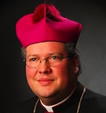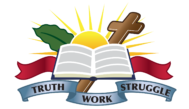
Prime Bishop Anthony Mikovsky
Beyond the Ordinary
As we enter into the summer months, we leave behind the season of Easter and the short season of important solemnities following it and enter into Ordinary Time. During the first part of the liturgical year, we spent our Sundays working through the entire life of our Lord. We waited for His coming during the season of Advent; we celebrated His birth and all it entails during Christmas; we then spend a time in the call of His disciples; we then entered into His passion and sufferings during the Lenten season and finally joyously celebrated our Lord’s Resurrection during the Easter season. Following this we celebrated the short season of the beginnings of the Church. We celebrated the birth of the Church during Pentecost; we honored the foundational teaching of the Holy Trinity; we honored Christ present to us in the Holy Eucharist at Corpus Christi and finally in the Polish National Catholic Church we celebrated the Solemnity of the Word of God, how we encounter Christ in His Word in Holy Scripture and its proclamation in our own time.
During Ordinary Time we now will have the extension of this Word of God Solemnity. It is during these Sundays, which we celebrate in the color green, that we delve into the Word of God more fully. This year of 2024 is the second of the liturgical cycles known as Year B. In this year we will focus on the Gospel of St. Mark as the second of the synoptic Gospels. The Gospel of Matthew, Mark and Luke are known as synoptic since they can be “seen together.” They contain many of the same episodes and are generally presented in the same sequence. This year as well though, since Mark’s Gospel is the shortest of the Gospels, we will also take a journey through the 6th chapter of John’s Gospel where we will focus on Jesus’ teachings regarding the Holy Eucharist given to us there. This will occur on the last Sunday of July and the entire month of August.
Before this occurs, during the months of June and July we will journey through chapters 4, 5 and 6 of the Gospel of Mark. During this time our Lord is engaged in His ministry in the region around the Sea of Galilee. We will encounter the teachings of Jesus in parables, in His performing of miracles and in His healings.
We begin with parables. These teaching stories usually involve items or situations which would be very familiar to those who heard Jesus. He spoke about things such as sowing seed in the ground. This is the first of the difficulties that we have in reflecting on these Ordinary Time Gospels. Although these items and situations would have been very familiar to those hearing Jesus, they might not be familiar to us. In order that we may fully understand what Jesus was telling His followers we must acquaint ourselves with life as it was during Jesus’ time in of the area of His ministry.
But even after that, parables are not lessons that are immediately obvious, rather they make us think a little. For instance, in the Gospel from the 11th Sunday in Ordinary Time, Jesus says, “This is how it is with the Kingdom of God; it is as if a man were to scatter seed on the land and would sleep and rise night and day and the seed would sprout and grow, he knows not how. Of its own accord the land yields fruit, first the blade, then the ear, then the full grain in the ear. And when the grain is ripe, he wields the sickle at once, for the harvest has come.” (Mark 4:26-29)
At first thought we know that this situation is generally true, but what does it tell us about the kingdom of God, the reign of God among us. Although we certainly may know a bit more about how seeds germinate and grow today, we can still certainly say that it is not our own doing that makes plants grow. Just look at how weeds grow in surprising places without any help or intention from anyone. But we also know that there is a reality to planting as well, which requires our input. If the land is prepared, then the yield of the plants will certainly be increased. There is also the reality that in order to partake of the fruits that come forth, we must come to the harvest and participate in it. The parable allows us to take time after we hear it to see how it applies to our own lives and our own situation. What is the work that needs to be done in my own life to prepare myself to receive the Word of God? How do I harvest the good produce that the kingdom of God brings to my life? We can remind ourselves that within the time of our Lord, all of these actions, the preparing of the fields, the harvesting of the grain, would all take place as community work. So then, we can ask ourselves, how involved within the community of the Church am I in accomplishing its work?
In this Galilee ministry, we will also see our Lord calming the storm while in a boat on the Sea of Galilee. “A violent squall came up and waves were breaking over the boat, so that it was already filling up. Jesus was in the stern, asleep on a cushion. They woke Him and said to Him, ‘Teacher, do You not care that we are perishing?’ He woke up, rebuked the wind, and said to the sea, ‘Quiet! Be still!’ The wind ceased and there was great calm. Then he asked them, ‘Why are you terrified? Do you not yet have faith?’ They were filled with great awe and said to one another, ‘Who then is this Whom even the wind and sea obey?’” (Mark 4:37-41)
Much like a parable, we must ask ourselves what is this miracle striving to teach us. In fact, we must always ask this question. There are no throw-off miracles in the Gospels. Jesus does not just hand them out like prizes. Jesus performs miracles to be examples of how the Kingdom of God breaks into our daily living. In reflection on this miracle, we must certainly know that the storms of life will come upon us at various times and it may feel like we are perishing. But the miracle reminds us that with faith in our Lord and Savior Jesus Christ, we can find our way through them. In the miracle, Jesus rebukes the winds and the waves, much as He does when casting out evil spirits. This may certainly be the case at times, but the parable above also lets us know that sometimes it will take work and effort on our part as well, as we cooperate with our Lord.
Another teaching that we will encounter on this journey with Jesus in His Galilee ministry are His healings. In particular, one important one is the healing of the women with a hemorrhage. “There was a woman afflicted with hemorrhages for twelve years. … She heard about Jesus and came up behind Him in the crowd and touched His cloak. She said, ‘If I but touch His clothes, I shall be cured.’ Immediately her flow of blood dried up. She felt in her body that she was healed of her affliction. Jesus, aware at once that power had gone out from Him, turned around in the crowd and asked, ‘Who has touched My clothes?’ … The woman, realizing what had happened to her, approached in fear and trembling. She fell down before Jesus and told Him the whole truth. He said to her, ‘Daughter, your faith has saved you. Go in peace and be cured of your affliction.” (Mark 5:25, 27-30, 33-34)
Here again the healing miracle is an example of the breaking-in of the Kingdom of God. But what else can be learn from the situation. The healing is caused when the woman draws near to Jesus. The lesson then for us is to answer the question, ‘How can I draw near to Jesus?’ Certainly as we reflect on the miracle, we know that we can spend moments in worship at the Holy Eucharist on Sunday. Especially when we receive Jesus present in Holy Communion we are brought close to Him. But there are other ways as well. Jesus told us, “For where two or three are gathered together in My name, there am I in the midst of them.” (Matthew 18:20) So we know that when we gather in the daily life of the Church, be it at worship, or in acts of loving kindness and service to others, we are drawing close to Jesus in that work.
So my brothers and sisters, as we begin our journey through the Ordinary Time season, remember that in and through it we accompany Jesus in His ministry in the Galilee region. We are present there with all of His followers. He speaks to us, not only in words, but in every action during this time. Let’s use this season to contemplate and reflect on the word and actions of Jesus: His parables, His teachings, His healings, His miracles. Let’s be assured that through all of these teachings and actions, the Reign of God is all around us. “Asked by the Pharisees when the kingdom of God would come, [Jesus] said in reply, ‘The coming of the kingdom of God cannot be observed, and no one will announce, “Look, here it is,” or “There it is.” For behold, the kingdom of God is among you.’” (Luke 17:20-21)

